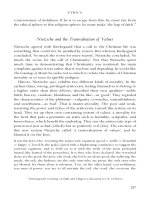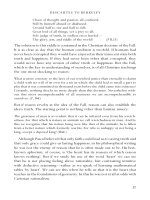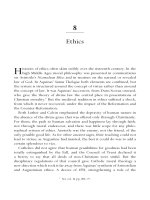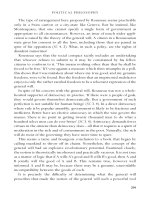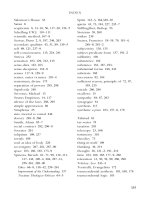The rise of modern philosophy a new history of western philosophy volume 3 (new history of western philosophy) ( PDFDrive ) (1) 254
Bạn đang xem bản rút gọn của tài liệu. Xem và tải ngay bản đầy đủ của tài liệu tại đây (21.62 KB, 1 trang )
MIND AND SOUL
impression of the self, and no idea of the self; there are simply bundles of
impressions and ideas.
Hume showed that the inner subject was illusory, but he did not expose
the underlying error which led the empiricists to espouse the myth of the
self. The real way out of the impasse is to reject the thesis that the mind
knows nothing but its own ideas, and to accept that a thinker is not a
solitary inner perceiver, but an embodied person living in a public world.
Hume was right that he had no self other than himself; but he was himself
not a bundle of impressions, but a portly human being in the midst
of eighteenth-century society.
It might be thought that a bundle of impressions was so diVerent from
any kind of active agent that it would be idle to discuss whether or not it
enjoyed free will. However, Hume goes on to address the topic of liberty
and necessity, quite oblivious to his oYcial philosophy of mind. (This is his
custom when pursuing a diYcult philosophical agenda—an agreeable
inconsistency for which we may be grateful.) His general thesis is that
human decisions and actions are necessitated by causal laws no less than
the operations of lifeless natural agents, and are equally predictable:
Were a man, whom I know to be honest and opulent, and with whom I live in
intimate friendship, to come into my house, where I am surrounded with my
servants, I rest assured that he is not to stab me before he leaves it in order to rob
me of my silver standish . . . A man who at noon leaves his purse full of gold on the
pavement at Charing Cross may as well expect that it will Xy away like a feather as
that he will Wnd it untouched an hour after. (E, 91)
Whatever we do, Hume maintains, is necessitated by causal links between
motive, circumstance, and action. Class, among other things, is a great
determinant of character and behaviour: ‘The skin, pores, muscles and
nerves of a day-labourer are diVerent from those of a man of quality: So are
his sentiments, actions and manners.’ Hume’s insistence on determinism
leads him to some implausible conclusions: that a group of labourers
should go on strike is for him as unthinkable as that an unsupported
heavy body will not fall.
Although he believes that human actions are determined, Hume is willing
to accept that we do enjoy a certain liberty. Like some of his successors, he
was a ‘compatibilist’, someone who maintains that freedom and determinism are compatible with each other if rightly understood. Our natural
239
